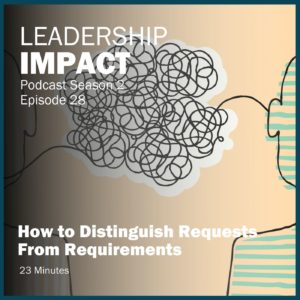
Fundamentally, humans are not awesome at distinguishing between requests and requirements. That point of miscommunication easily erodes trust in relationships and undermines a team’s focus on priority projects. When we begin to see where the wires get crossed (and the huge impact that causes), new pathways for circumventing these problems become apparent. Join Kari Granger and Paul Adams as they unpack this ubiquitous breakdown and give us conversational doorways to getting onto the same page with our bosses, colleagues, direct reports, spouses, and children.
In This Episode:
00:56 – Introducing today’s topic: How to Distinguish Requests From Requirements
02:23 – Paul’s experience of questioning the status quo of an organization
05:22 – Tip: experiment by asking, “By when do you need that?”
08:24 – The reverse of asking, “By when do you need that?”
09:20 – The importance of distinguishing between a request and a requirement
12:35 – An example of how to initiate new conversations with your boss or colleague
13:55 – Paul shares something he wants his team to get out of the Productivity and Accomplishment Course
15:30 – Kari shares how a committed and accountable colleague of hers counter-offers her requests
18:35 – Kari and Paul distinguish suggestions, requirements, and requirements
19:59 – Matching our language to our meaning: the example of a client who said ‘strongly recommend’ when expressing requirements
21:17 – Paul’s professional and personal take-aways from this episode
21:53 – Paul challenges listeners to consider what key relationships could be powerfully impacted by this distinction and recommends a way to start that conversation
Quotes:
Want More? Subscribe for Weekly Episodes!
- Apple Podcasts
- Google Play
- (Or wherever you listen to podcasts!)
Links:
The Mission Control Productivity and Accomplishment Course
Paul’s Other Podcast: Your Business Your Wealth
LEADERSHIP IMPACT PODCAST
See more episodes
Acknowledgements:
Our work is mosaic art. We read, study, and practice many philosophies, methodologies, and modalities of human performance, to ensure that our approach best serves our clients. We would like to acknowledge all of the thought leaders and organizations, whose ground-breaking work has influenced the Granger Network approach – especially Fernando Flores, Jim Selman, Michael C. Jensen, Julio Olalla, Pluralistic Networks, The Newfield Network, and the Strozzi Institute.


Podcast production and marketing provided by FullCast.




